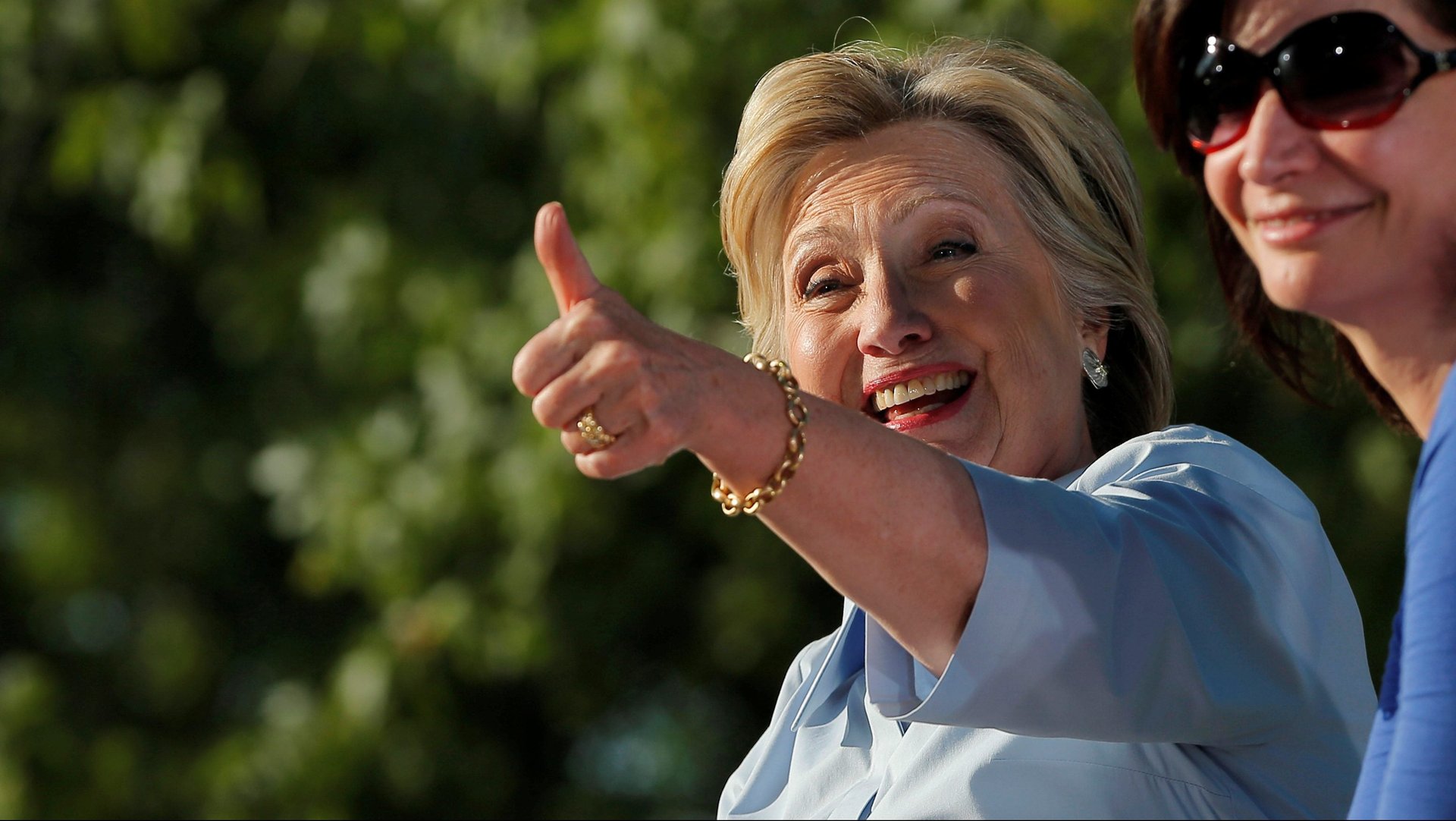Hillary Clinton is finally beating Donald Trump at his own branding game
Things that Republican presidential candidate Donald Trump likes to brand include steaks, casinos, airlines, vodka, magazines, and “universities.” Most of all, though, Trump likes to brand people. Hillary Clinton is “Crooked Hillary.” Marco Rubio is “Little Marco.” Elizabeth Warren is, in a vaguely racist epithet, “Pocahontas.”


Things that Republican presidential candidate Donald Trump likes to brand include steaks, casinos, airlines, vodka, magazines, and “universities.” Most of all, though, Trump likes to brand people. Hillary Clinton is “Crooked Hillary.” Marco Rubio is “Little Marco.” Elizabeth Warren is, in a vaguely racist epithet, “Pocahontas.”
None of the victims of his derisive branding have managed to turn the iron back on Trump. Until now. The presidential campaign of self-professed branding genius Donald Trump has just been #branded.
You’ve heard the comment: At a Democratic fundraiser in New York last week, Hillary Clinton argued that half of Trump’s supporters are, “racist, sexist, homophobic, xenophobic, Islamaphobic,” and she placed these people in her metaphorical “basket of deplorables.”
The idea that Trump and some of his supporters are bigoted is not new. But Hillary Clinton has now given it a name. A funny, carefully worded name. A memifiable name. A name that people will remember, that sticks in the brain like a catchy song. A name that Trump, whose political and personal future rests in the hands of these so-called “deplorables,” can’t escape.
Never mind that the other part of Clinton’s comment, which has received far less attention, painted a much more sympathetic picture of the other half of Trump’s supporters, as people let down by the system and desperate for change—”Those are people we have to understand and empathize with as well,” she said.
That’s neither here nor there. The story the press picked up on is that Clinton called half of Trump’s supporters “deplorable.” In any presidential season—even this crazy one—that’s likely to raise hackles.
Yes, in the short term, the comment may very well damage Clinton. Even if the “deplorable” line was accurate, which it was, it came across as Clinton condemning a large swath of the country, an impression some cable TV pundits exacerbated. And it’s usually not a good look to attack a candidate’s supporters rather than the candidate himself—it certainly didn’t work for Mitt Romney in 2012.
Hillary soon said she regretted the statement, at least the part where she referred to ”half” of Trump’s supporters. But was this really a “gaffe” (“a social or diplomatic blunder” according to Merriam Webster) or something more strategic? Was it a “Kinsley gaffe,” a political misstep named after the journalist Michael Kinsley, who famously said, “A gaffe is when a politician tells the truth—some obvious truth he isn’t supposed to say”? Or was it a brilliantly executed branding play?
No one but Clinton herself and her closest advisors know for sure. But now, the discussion is beginning to shift away from Clinton’s provocative word choice and toward the fact that—hey, wait a second—she might have been right. Her comments have given political columnists and online commentators a perfect opportunity to zero in on and rebuke that element of Trump’s base—and his failure to denounce the deplorable “racist, sexist, homophobic, xenophobic, Islamaphobic” values that some of his supporters embrace. Clinton has left Trump with no way to remove the stinky veneer of deplorability enveloping his campaign.
Another indication that Clinton’s use of ”deplorable” wasn’t just a misguided gaffe, but rather a calculated political risk: Clinton hasn’t stopped using the word. In fact, she has doubled down on “deplorable,” continuing to link Trump’s campaign to white supremacists like former Ku Klux Klan leader David Duke:
In doing so, Clinton has exposed one of Trump’s central tenets—that America is too politically correct—as the hollow and hypocritical banality that it is. Right or wrong, Clinton was being politically incorrect by calling half of Trump’s supporters deplorable. And yet, Trump reflexively demanded that she apologize. Trump’s running mate Mike Pence said her remark was “shocking.”
This puts the Republicans in the awkward position of demanding more political correctness—at least as applied to those criticizing Donald Trump or those who support him. (And for those efforts, the ticket earned the public praise of the white supremacist Duke.)
The coverage of Clinton’s “basket of deplorables” moment will inevitably fade as the media moves onto the next controversy, real or manufactured. What won’t dissipate into the election phantom zone is the truth at the heart of Clinton’s comment, that many deplorable people do, in fact, support Trump.
The brand—and memes—of deplorability surrounding Trump’s campaign will stick and proliferate. The Trump campaign and the word “deplorable,” are now inextricably intertwined.